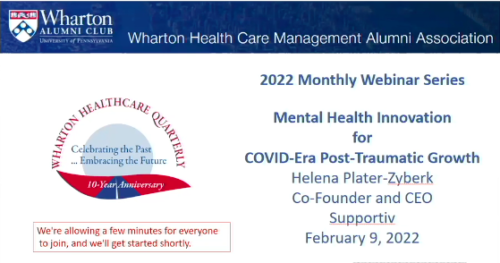Supportiv CEO Presents Webinar For Wharton Healthcare Quarterly On Covid-Era Post-Traumatic Growth

In a recent webinar honoring Wharton Healthcare Quarterly’s 10-year anniversary, Supportiv CEO and Co-Founder Helena Plater-Zyberk explains the importance of mental health innovation for national post-traumatic growth in the covid era and beyond.
Our nation had an untenable mental health crisis even before the pandemic began. Now, over two years later, how does the word “trauma” apply to all of us? And how can we ensure our collective growth and wellbeing, moving forward?
“It feels like a bit of a hopeless situation…And it feels like we’re on our own. It’s going to be a self-help-driven manner of picking ourselves up. The message I want to send is that there is another approach, and that approach is not just trying to help yourself, but also help other people.” – Helena Plater-Zyberk
Helena Plater-Zyberk greeted webinar participants with a rundown on the definition of trauma, current gaps in our national mental healthcare system, and a strategy for approaching our mental healthcare provider gap via mental health innovation.
On-demand peer support ends up being a key care modality in this time of national trauma and mental health crisis, for its ability to reach key populations without labeling and medicalizing emotional issues.
As Plater-Zyberk shares in the webinar program: “Peer support is a care modality that can fill the gap due to its broad community appeal, especially among those least likely to pursue traditional mental health care – namely marginalized identities, vulnerable populations and, yes, men. Online, on-demand 24/7 access to a national peer-to-peer support network can improve the coping and healing process of millions.”

To learn more about collective trauma, post-traumatic growth, mental health needs, and innovative solutions during times of MH crisis, watch the full webinar on Vimeo, here. And learn more about Supportiv here.
Contact Us
For anonymous peer-to-peer support, try a chat.
For organizations, use this form or email us at info@supportiv.com. Our team will be happy to assist you!
